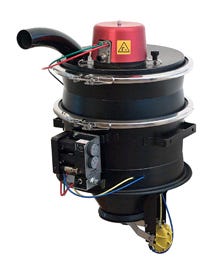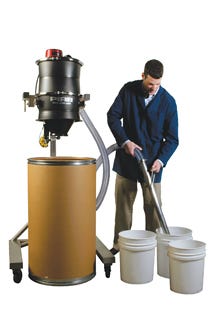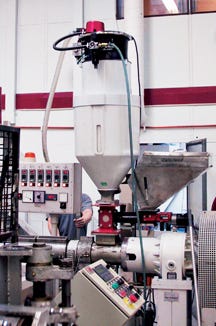Tectubes: Vacuum conveyors automate resin throughput
February 4, 2014


Targeting industrial applications, the closed-vacuum conveyor is based on patented pump technology said to lower energy consumption.
As its name implies, Tectubes Sweden AB, Astorp, Sweden, knows the packaging tube business. Formerly known as Norden Tubes, the largest supplier of tubes in northern Europe, the company has a long and proud history in tube packaging.
Founded as early as 1917 in Kungsör, Sweden, Tectubes manufactures an extensive line of stock and custom tube packaging in both plastic and aluminum and produces about 1 million tubes each year. The containers range in diameter from 0.75 to 2 in. and in lengths from 2 to nearly 8 in. and are available decorated in multiple colors by screen or offset printing, in-mold labeling and foil stamping. Tectubes' facility in Hjo, Sweden, makes the tubes from various polyethylene and polypropylene resins, depending on the specific application, and can extrude or injection-mold them with barrier layers of ethylene vinyl alcohol.
The squeezable tubes provide essential content protection, functionality, hygiene and user-friendly seals, and the company's longstanding reputation for enhancing its customers' products with visual impact is well-known. Specializing in innovative structural designs, the company offers unique shapes including distinctive ovals, tubes with large display areas, sloping-shoulder designs that facilitate product dispensing, tubes that use less packaging material and tubes with clever closures that are both convenient and attractive. Tectubes realized recently that in order to manufacture more tubes in less time and to continue maintaining internal production efficiencies, it needed to upgrade its existing mechanical conveyors for transporting raw tube material—resin—with a set of pneumatic vacuum-conveying systems provided by PIAB (www.piab.com).
Low-fat yogurt maker YoFarm in Naugatuck, CT automated the way it conveys yogurt toppings with a VACUUM CONVEYOR from PIAB. To view the story, see www.packagingdigest.com/ info/YoFarm03
Executives at Tectubes saw a specific opportunity to reduce machine downtime in the tube-converting operation by improving the way the PP and PE tube resins are handled. "Handling all of the plastic granules was [becoming] too labor-intensive, so we sought a way that could lower our expenses by automating and streamlining the resin-handling process," admits Tommy Andersson, production engineer at Tectubes.
He goes on to say that Tectubes wanted to reduce its overall resin-handling time as well as to try to prevent employee handling injuries. Tectubes was especially interested in automating the handling process that involved bending, lifting and other movements. A solution came with PIAB's analysis and recommendation to replace the existing mechanical conveyors with its IC 3301 compressed-air-driven vacuum conveying system.

Taking up minimal floorspace, the vacuum system has few moving parts. It conveys tube resin transported by pipes or hoses into bulk bins. Compressed air cleans its filter during each cycle. Suction and discharge is pneumatically controlled.
Designed for industrial applications like the consistent, hygienic transfer of Tectubes' resins, the new IC Series of vacuum conveyors is based on a new, patented pump technology that PIAB says can contribute to lower energy use.
PIAB Sweden installed the first conveyor at the Hjo facility in March 2005. "Customers have come to us with inquiries for this type of a vacuum conveyor," relates Markus Tell, business unit manager for vacuum conveying, at PIAB AB. "The objective was to make a simple, ergonomic and user-friendly system with high performance. So we created a closed-vacuum system that not only protects the material being handled from external influences, but also protects the user from the material being handled."
The system's vacuum pump draws the resin pellets for tubemaking from a feed station through a conveying tube and into a closed container. When the container is full, the pump stops, and a valve at the bottom of the container opens and discharges the material from the tube. Constructed of high-grade steel, the conveyor protects users from inhaling potentially harmful materials and helps prevent product damage caused by external elements.
The IC 3301 system is available in three versions that handle 1,100 to 4,400 lb/hr, depending on the conveying distance and the characteristics of the material being handled. Tectubes' IC3301 system is equipped to process the 1,100-lb quantity. Designed to cope with demanding circumstances, a unique filter design traps particles to prevent dust and contamination in the plant. During each cycle, compressed air cleans the filter to ensure that it stays hygienic. The suction and discharge times are pneumatically controlled.
Instead of taking up valuable floorspace, the IC Series has a compact design, which Tectubes likes. It conveys the resin transported by pipes or hoses to provide extra flexibility. "We chose the IC Series because it's easy to control and requires less maintenance compared to the other methods we considered," says Andersson. "We wanted a conveyor that didn't take up too much space and didn't have too many moving parts that could break down. This could result in unwanted downtime, additional maintenance and higher costs."

The system's vacuum pump draws the resin pellets from a feed station through a conveying tube and into a closed container.
The former conveying operation relied on a mechanical system that required regular lubrication to maintain. Having to grease the conveyors would often cause machine interruption and slowed productivity down, according to Andersson. The new compressed-air-driven vacuum pumps are distributed and located at the point-of-use, so the individual pumps can function independently, without consuming compressed air between operating cycles, which also helps minimize energy use. "The vacuum conveyors have proven to be extremely reliable," says Andersson. "We now have ten systems running without interruption and they are easy to operate and require almost no maintenance."
The driving force behind the savings is the patented COAX(R) technology, which PIAB reports is based on its multistage ejector concept. COAX creates a vacuum with compressed air that can handle up to 15 tons of Tectubes' plastic flake per hour, with little energy consumption.
COAX integrates the internal components of the multistage vacuum pump into a vacuum cartridge designed to provide a small, efficient and reliable setup, the company says. When compressed air passes through the vacuum nozzles, air is pulled through with the stream of compressed air, creating suction at the opening of each stage. PIAB says that COAX is efficient because it puts energy to maximum use. Its vacuum pumps based on COAX operate at low and fluctuating feed pressures of 25 to 90 psi, with sustained vacuum performance. According to a pleased Tell, these factors keep maintenance, and therefore potential employee handling injuries at the plant, to a minimum.
More information is available:
PIAB USA, Inc., 800/321-7422. www.piab.com.
About the Author(s)
You May Also Like


